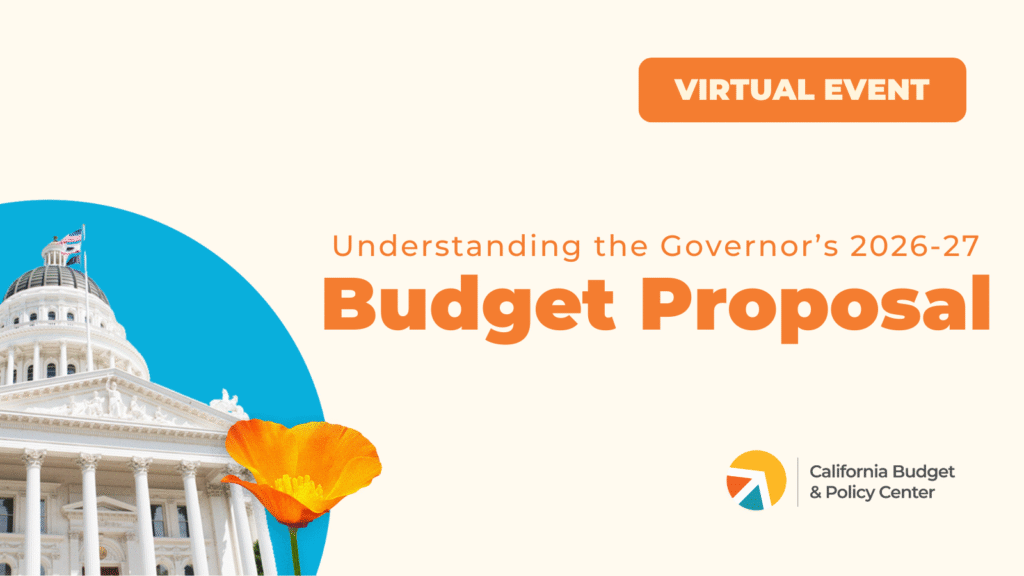key takeaway
California’s behavioral health system depends on Medi-Cal to serve adults and children. Changes under H.R. 1 threaten Medi-Cal’s core funding and eligibility, putting at risk the state’s investments in behavioral health and housing and leaves more Californians without access to needed care.
California has made historic progress in transforming its behavioral health system, ranging from expanding access, integrating care, and linking success with housing and community supports. But looming federal cuts to Medi-Cal (California’s Medicaid program), enacted under H.R. 1 — the harmful Republican mega bill — threaten to strip care away from children, youth, adults, and older Californians, causing lasting harm and long-term costs for California communities.
More than one in three Californians rely on Medi-Cal for essential health care, including life-saving behavioral health services, which encompass mental health care and substance use disorder treatment. These services range from preventative and lower-acuity care delivered by Medi-Cal Managed Care providers to more acute, high-need treatment delivered by county behavioral health departments. They are critical at every stage of life — from school-based mental health services for kids to care for adults navigating trauma, chronic illnesses, or recovery.
Yet, H.R. 1 has imposed Medicaid cuts, harmful red tape and administrative barriers, and discriminatory restrictions based on age or immigration status, undermining the foundation of care millions of Californians need. While H.R. 1 does not eliminate behavioral health benefits, it will reduce coverage and funding in ways that threaten access, especially for preventative and lower-acuity provided by Medi-Cal providers. This will increase demand on county-administrered higher-acute services, placing further strain on the entire behavioral health system.
The erosion of coverage and Medi-Cal funding restrictions could also destabilize the major interconnected behavioral health reforms state leaders have advanced in recent years, such as CalAIM, BH-CONNECT, the Children and Youth Behavioral Health Initiative, and the voter-approved Behavioral Health Services Act (BHSA), each of which heavily rely on leveraging federal dollars and were crafted with current coverage levels in mind.
As Medi-Cal enrollment is poised to decline, the effects will be felt across California’s behavioral health system and these key reforms. Health providers will lose critical Medi-Cal reimbursements that sustain community-based services, which will lead to weakened capacity and even more forced reductions in care. In practice, H.R.1 threatens to erode the health system from both sides — reducing coverage while stripping away the funding needed to continue serving those who remain — leaving Californians with mental health and substance use needs with even fewer pathways to treatment and at risk of their conditions worsening.
These harmful consequences also extend beyond health care. Federal cuts and restrictions will weaken California’s homelessness response by making it harder for unhoused people with behavioral health needs to access and maintain Medi-Cal funded services that help them find and keep stable housing. They may also impair the state’s ability to pair state funds with federal dollars to bridge behavioral health and housing supports, disrupting the continuity of care and housing for many.
Ultimately, as Medi-Cal faces deep reductions, with millions of people poised to lose coverage, so too will the services that support Californians’ health, housing, and well-being. This report provides an overview of who California’s behavioral health system serves, why Medi-Cal is integral to its success, and how the Republican mega bill, H.R.1, could undermine key state reforms. As state leaders confront these challenges, it’s critical for policymakers to protect proven policies, reduce harm, and ensure all Californians receive the essential care they need to be healthy and thrive.
Key Terms
- Any mental illness
- Medi-Cal Specialty Mental Health Services
- Serious emotional disturbance
- Serious mental illness
A note on county behavioral heath services
County behavioral health systems serve Californians with the most acute and complex behavioral health needs. While these systems rely heavily on Medi-Cal, individuals receiving specialty services counties provide — including Specialty Mental Health Services (SMHS) and Drug Medi-Cal services — are exempt from H.R. 1’s new work requirements and other direct recipient cost-sharing, and Medi-Cal reimbursements for these covered services will continue. This means that Californians with more acute behavioral health needs will continue to be able to access the specialty services that counties provide.
However, Medi-Cal also provides preventive and lower-acuity behavioral health care delivered outside county systems. As Californians lose Medi-Cal coverage under H.R. 1, they will also lose access to early intervention and preventive behavioral health care, increasing the likelihood that untreated conditions would worsen into more severe needs that counties are typically responsible for addressing if they have the resources. But because county behavioral health departments operate with relatively fixed financing and limited capacity, they are not positioned to absorb an influx of higher-need patients created by the loss of preventive Medi-Cal coverage — potentially leaving many Californians with little, if any, access to appropriate behavioral health treatment.
jump to
- Behavioral Health Care Needs Across Ages for Californians
- Republican Mega Bill H.R. 1 Threatens Californians’ Access to Behavioral Health Care
- Federal Financing Restrictions Undermine Behavioral Health Services
- H.R. 1 Eligibility Changes Will Limit Behavioral Health Coverage for Californians
- Federal Changes Put Interconnected State Behavioral Health Initiatives At Risk
- State Leaders Can Act to Protect Californians’ Right to Comprehensive Behavioral Health Care
Californians of All Ages and Backgrounds Need Behavioral Health Care
Medi-Cal is the foundation of California’s behavioral health system, providing mental health and substance use treatment for Californians of all ages. In 2023, over half of all people enrolled in Medi-Cal — roughly 8.25 million people or every 1 in 5 Californians — accessed mental health services.
Adults
Nearly 1 in 5 California adults experience some form of mental illness, and about 1 in 20 have a serious mental illness that makes it difficult to carry out daily activities. Substance use disorders are also notable, affecting roughly 1 in 6 adults in the state. However, these conditions often overlap, with 1 in 14 California adults experiencing both a mental illness and a substance use disorder. People with co-occurring conditions often face greater barriers to care and benefit most when services are integrated and address both needs together. In 2021-22, nearly 345,000 adults over the age of 21 had at least one Medi-Cal Speciality Mental Health Services visit, reflecting how essential Medi-Cal has become in serving Californians with the most acute need to care.
For adults experiencing homelessness who have a behavioral health condition, Medi-Cal is often the only pathway to consistent care and stability. Among unhoused Californians, roughly 75% were covered by Medi-Cal, although even more are likely to qualify. Data quantifying the number of unhoused people with behavioral health conditions are not precise, but there is strong evidence that homelessness can trigger or worsen mental health conditions and push people toward coping behaviors like substance use. The UCSF Statewide Study of People Experiencing Homelessness found that over 80% of participants had experienced a mental health condition for a significant period of time that impaired their life function, mainly anxiety or depression, and nearly 65% reported using substances regularly at some point. These issues often co-occur, but the full extent is not reported.
Children and Youth
Medi-Cal covers every 3 in 7 California children, providing critical behavioral health care for those facing anxiety, depression, or trauma. In 2021-22, 5.8 million children and youth under the age of 21 were eligible for Medi-Cal Specialty Mental Health Services in California, and more than 246,000 received care. In 2024-25 alone, California schools received over $1 billion in Medi-Cal payments for services rendered to students, which includes school-based mental health services.
Still, the need continues to grow. Previous research shows that 1 in 14 children has an emotional disturbance that limits daily functions, a figure likely higher today given the lasting effects of the COVID-19 pandemic on children’s mental health. A recent survey found that 94% of Gen Z youth reported having mental health challenges in a typical month, with youth of color and LGBTQ+ youth reporting very high rates of stress and fear of discrimination.
These challenges are also not carried equally. Black, Latinx, Native American, and Pacific Islander children and youth face the highest rates of serious emotional disturbances because of the compounding factors that increase the risk of behavioral health conditions. This includes the effects of generational trauma, economic insecurity, barriers to care, and the impacts of historical and ongoing racism and discrimination towards them and their families.
Despite the great need for increased behavioral health services, new cuts and restrictions to Medicaid will limit access to life-saving care.
Recently Enacted Harmful Republican Mega Bill, H.R. 1, Will Impede Californians’ Access to Behavioral Health Care
Medi-Cal is the backbone of public mental health and substance use services in California. Federal matching funds — drawn down through Medi-Cal reimbursements — form the core of financing for behavioral health care across a range of needs.
In July 2025, Republicans in Congress and the Trump Administration enacted H.R. 1, a sweeping law that delivers the deepest health care cuts in U.S. history. The bill slashes roughly $1 trillion from Medicaid over the next decade. For California, the consequences are especially severe. As many as 3.4 million Californians could lose Medi-Cal coverage and the state could lose up to $30 billion in federal Medicaid funding each year.
These cuts will destabilize Medi-Cal and threaten core health services, including behavioral health care, in two major ways. The new law:
- Imposes financing restrictions that strip billions of dollars in federal support to states.
- Creates eligibility and access barriers that make it harder for Americans to enroll in and keep their coverage.
No matter the mechanism, these changes amount to deep cuts that will ripple across all Medi-Cal services and hit behavioral health care especially hard.
How H.R.1 Financing Restrictions Will Impact Californians with Behavioral Health Conditions
California has long used provider taxes — most notably the Managed Care Organization (MCO) tax — to raise state revenue that is then matched with federal Medicaid dollars. These revenues sustain Medi-Cal.
H.R. 1 undermines this model by banning new provider taxes and imposing rules that invalidate California’s current MCO tax structure. The law also caps provider tax rates over time and lowers the federal cap on Medicaid managed care payments, further restricting California’s ability to draw down federal funds.
While not all provider tax revenues are dedicated to behavioral health, Proposition 35 (approved by voters in 2024) earmarks a portion of MCO tax revenue for behavioral health facilities, workforce expansion, and other investments in mental health and substance use treatment. With H.R. 1 now law, these investments are at risk because California’s MCO tax is out of compliance with new federal restrictions.
If provider tax revenues are significantly reduced or eliminated, California will face major budget shortfalls that threaten Medi-Cal coverage and funding streams providers depend on. The result: less revenue, fewer federal matching dollars, and diminished resources for behavioral health care — particularly in communities that already face barriers to treatment.
How H.R. 1 Eligibility and Access Restrictions Will Limit Behavioral Health Coverage for Californians
H.R. 1 introduces sweeping eligibility and access restrictions that will push Californians off Medi-Cal and disrupt reliable coverage for preventative and lower-acuity behavioral health services. Losing Medi-Cal coverage could disrupt access to medications, counseling, and treatment programs, heightening the risk of crisis, hospitalization, or incarceration. The new law:
- Excludes immigrant groups from Medi-Cal coverage. Refugees, asylees, humanitarian parolees, trafficking survivors, and other immigrants previously eligible under humanitarian protections will lose Medi-Cal, which would take away access to Medi-Cal behavioral health care from some of the most vulnerable people in the state.
- Imposes burdensome work requirements for adults in the Affordable Care Act (ACA) expansion population, which could result in 3 million adults in California losing Medi-Cal coverage. These reporting requirements create barriers for people with a behavioral health condition who may struggle to maintain steady employment and complete complex paperwork. The barriers posed are especially acute for people experiencing homelessness. While exemptions exist — for example, for individuals considered “medically frail” due to a disabling mental health condition or substance use disorder — it remains unclear how these will be applied or what documentation will be required.
- Increasing Medi-Cal eligibility checks for adults in the ACA expansion population, which will make it more challenging for them to maintain their Medi-Cal coverage even if they remain eligible. Disruptions in coverage can interrupt treatment plans and destabilize recovery for people managing chronic mental health or substance use conditions.
- Limits retroactive Medi-Cal coverage from 3 months to 1 month for ACA expansion adults and to 2 months for all other adults. This change may leave people who enter treatment during a behavioral health crisis, such as a psychiatric emergency or overdose, without financial protection for care received before enrollment.
Overall, this new law will not only strip health coverage from millions of Californians but also undermine the stability of the behavioral health care system. People with mental health conditions and substance use disorders depend on stable, continuous access to care. Under H.R. 1, more people are likely to lose access to healthcare coverage, experience worse health outcomes, and turn to emergency rooms as substitutes for care.
Note: The ACA expansion population refers to adults under age 65 without dependents who qualify for Medi-Cal based on income (up to 138% of the federal poverty level) and immigration eligibility criteria. California fully implemented this expansion in 2014 under the Affordable Care Act.
The consequences of these cuts to financing, as well as eligibility and access, will have a significant impact on the health care system. As Medi-Cal enrollment declines, so too will reimbursements that providers depend on to sustain behavioral health services. This loss of revenue will weaken provider capacity, reduce the availability of community-based programs, and further strain county behavioral health systems that are already stretched thin.
In effect, H.R. 1 squeezes the system from both sides — fewer people insured and fewer dollars to care for those who remain — leaving Californians with mental health and substance use needs with even fewer pathways to treatment.
H.R. 1 Puts Interconnected State Behavioral Health Initiatives At Risk
H.R. 1 jeopardizes California’s significant behavioral health reforms that were designed to support the state’s most vulnerable residents and are fundamentally dependent on Medi-Cal’s flexibility and federal funding. This includes efforts such as CalAIM, BH-CONNECT, the Children and Youth Behavioral Health Initiative (CYBHI), and voter-approved reforms to the Behavioral Health Services Act (BHSA). Each is a strategic, interconnected effort designed to create a more equitable and coordinated system of care that supports the well-being of vulnerable Californians.
Initiatives like CalAIM and BH-CONNECT rely on federal waivers to use Medicaid funding for flexible purposes such as housing navigation. While the federal government has the authority to rescind or modify waivers or withhold funding, doing so would require navigating complex legal and administrative processes. Plus, such actions could provoke legal challenges from state officials and advocacy organizations.
However, by weakening Medicaid financing and eligibility, H.R. 1 still undermines the financial foundation that makes all of these initiatives possible. It threatens essential supports ranging from intensive case management to in-school mental health services for children to wrap-around housing supports and transitional rent that help unhoused individuals with behavioral health conditions move into stable housing. It also undermines billions of dollars the state has already invested in transforming care and reducing homelessness.
Medi-Cal is the common thread tying together these reforms, making its stability essential to sustaining these supports.
CalAIM’s Homelessness-Ending Housing Supports and the BHSA Rely on Medi-Cal
CalAIM (California Advancing and Innovating Medi-Cal) is targeted to enhance care coordination, improve health outcomes, and address social determinants of health for Medi-Cal enrollees — particularly for those facing complex challenges such as homelessness, chronic medical conditions, and justice system involvement. Two key components of CalAIM are particularly important for serving unhoused or at risk Californians: Enhanced Care Management and Community Supports. Together they ensure robust case management is paired with non-clinical services like housing navigation, security deposits, and transitional rent, interventions proven to help people move into and stay in stable homes.
Between January and March 2025 alone, these supports served 68,000 adults and nearly 13,000 children experiencing homelessness, with providers serving youth nearly doubling. Altogether, nearly 430,000 Californians have accessed CalAIM Community Supports, with 1.1 million services delivered since 2022.
CalAIM Community Housing Supports are also integral to the Behavioral Health Services Act (BHSA), which requires counties to dedicate 30% of their BHSA dollars to housing interventions. Counties must first leverage Medi-Cal housing-related supports before using BHSA funds, making Medi-Cal fundamental to this system. However, if people lose or experience lapses in coverage, or if federal approvals that allow these services to be reimbursed are weakened, the state risks losing the foundation that makes these interventions possible.
BH-CONNECT Strengthens Behavioral Health Care Through Medi-Cal
BH-CONNECT (Behavioral Health Community-Based Organized Networks of Equitable Care and Treatment) builds on the reforms spearheaded by CalAIM to strengthen California’s behavioral health system for Medi-Cal members living with significant behavioral health needs. Approved by the federal government in 2024, it expands community- and evidence-based services for children, youth, and adults with behavioral health conditions, especially for at-risk Californians like those experiencing homelessness, children in the child welfare system, and people leaving institutional care. It also invests in workforce development and incentivizes counties to improve access, outcomes, and system performance.
CYBHI Improves Medi-Cal Behavioral Health Supports for Youth Amid BHSA Shifts
CYBHI (Children and Youth Behavioral Health Initiative) expands prevention and early intervention supports for children through schools and community settings, many of which are reimbursed through Medi-Cal. CYBHI’s focus on youth is especially critical now as recent changes to the BHSA are forcing counties to restructure existing funding allocations. This shift will require cuts to certain behavioral health services — particularly in prevention and early intervention, innovative programs, and other core services that primarily support children and youth. Moreover, when parents or guardians lose coverage, their children are often left vulnerable to losing their access to care too. This not only disrupts care for children but also creates additional administrative challenges for schools and providers.

Federal Policy
The federal government plays a major role in shaping California’s budget, economy, and the well-being of its people.
State Leaders Can Act to Protect Californians’ Right to Comprehensive Behavioral Health Care
Massive cuts in the Republican mega bill, H.R. 1, threaten Medi-Cal financing and the behavioral health care that it provides, and California risks losing the progress it has made to connect care, housing, and recovery for Californians of all ages statewide. Addressing the federal cuts will require state leaders to do everything possible to protect communities and minimize harm.
The California Health and Humans Services Agency has announced plans to pursue administrative solutions to minimize disenrollment, such as using existing databases to automatically qualify individuals for exemptions and expand public education on the new requirements. Still, even with these efforts, many Californians will inevitably lose coverage unless the state provides additional funding to protect those most at risk.
Policymakers have a path forward to ensuring California remains a national leader in providing comprehensive behavioral health care. By raising significant, ongoing revenue, state leaders can fund the investments needed to protect care and support the well-being of Californians, especially those who rely on critical behavioral health services.




